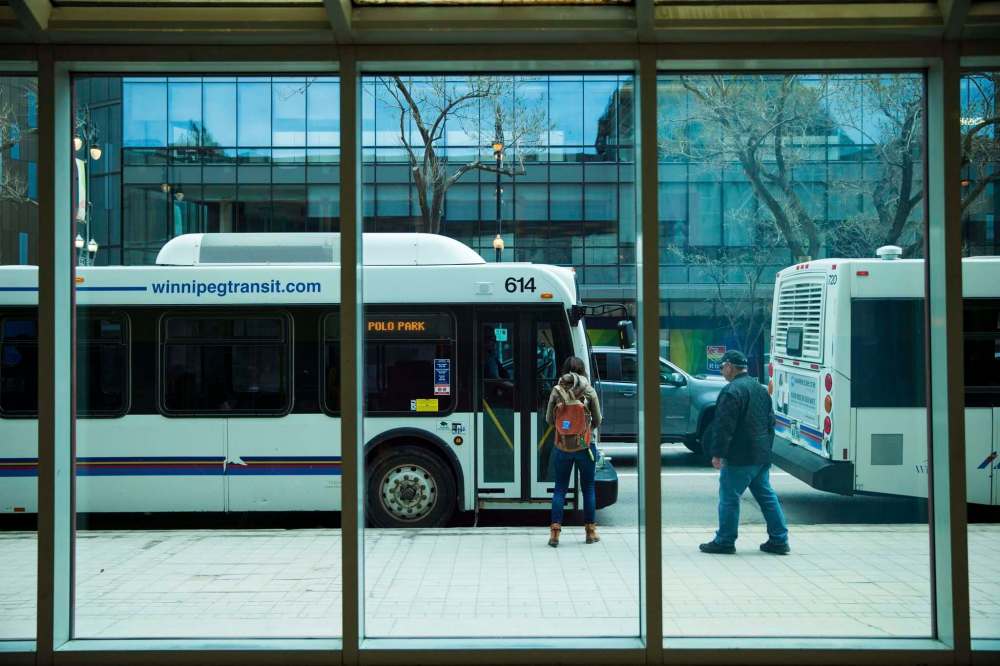Number of Winnipeg Transit drivers with PTSD skyrockets
Advertisement
Read this article for free:
or
Already have an account? Log in here »
To continue reading, please subscribe:
Monthly Digital Subscription
$0 for the first 4 weeks*
- Enjoy unlimited reading on winnipegfreepress.com
- Read the E-Edition, our digital replica newspaper
- Access News Break, our award-winning app
- Play interactive puzzles
*No charge for 4 weeks then price increases to the regular rate of $19.00 plus GST every four weeks. Offer available to new and qualified returning subscribers only. Cancel any time.
Monthly Digital Subscription
$4.75/week*
- Enjoy unlimited reading on winnipegfreepress.com
- Read the E-Edition, our digital replica newspaper
- Access News Break, our award-winning app
- Play interactive puzzles
*Billed as $19 plus GST every four weeks. Cancel any time.
To continue reading, please subscribe:
Add Free Press access to your Brandon Sun subscription for only an additional
$1 for the first 4 weeks*
*Your next subscription payment will increase by $1.00 and you will be charged $16.99 plus GST for four weeks. After four weeks, your payment will increase to $23.99 plus GST every four weeks.
Read unlimited articles for free today:
or
Already have an account? Log in here »
Hey there, time traveller!
This article was published 16/07/2018 (2704 days ago), so information in it may no longer be current.
The number of Winnipeg Transit drivers off work suffering from traumatic stress increased dramatically between 2016 and 2017.
Data released by the Workers Compensation Board reveals 14 Transit drivers were unable to work in 2017 because of traumatic stress, compared to two drivers in 2016.
The WCB data underscores the reality of a driver’s daily routine, said Aleem Chaudhary, president of Amalgamated Transit Union Local 1505.

“We’re having more and more incidents on the buses every day. Operators being spit on and threatened,” Chaudhary said.
“New drivers take these things seriously compared to the old days where we toughed it out.
“It’s not an easy thing to take, being threatened every day simply for trying to do your job… You’re trying to do your job, provide a service to people and trying to be happy. It’s not an easy job.”
The data, first reported by the CBC, categorizes the types of injuries reported by Transit drivers for the period from 2014 to the end of June 2018.
Injuries caused by bodily movements (including bending, climbing, reaching, twisting) topped the list reported by Transit drivers in 2017, at 20; followed closely by transportation-related injuries, at 19.
There were 14 assaults and 10 falls reported.
For the first six months of 2018, the data shows three Transit drivers took time off work because of traumatic stress.
A WCB official attributed the increase in traumatic stress claims among Transit drivers to greater public awareness of changes in provincial legislation which came into effect Jan. 1, 2016, which made it easier for the claims to be accepted.
Darren Oryniak, vice-president of compensation services, said presumptive legislation on post-traumatic stress assumes workers diagnosed with post-traumatic stress disorders suffered the injury because of exposure at work, unless it can be proven otherwise — with the result that workers began filing claims for injuries that weren’t accepted in the past.
“There was a lot of discussion in the media and various unions and workplaces that there was new legislation that people could file a claim.
With all that awareness, people filed more claims,” Oryniak said, adding similar situations had been seen in several occupations such as nursing, paramedicine, police, social workers and correctional officers.
“The big jump for transit operators came in 2017. In many other sectors we saw an uptake in 2016 and into 2017, and now it’s settled down.”
Chaudhary, who spent 18 years behind the wheel of a Transit bus, said he had been involved in two assaults — the first occurred 12 years ago, when he reminded a passenger to pay their fare.
“That person just turned around and smacked me in the face… for just doing my job,” Chaudhary said.
There doesn’t appear to be any slowdown in the number of assaults and other stress-causing incidents, Chaudhary said, adding in the past month, a passenger discharged pepper spray on a driver and passengers and, in a second incident, a passenger threatened a driver with a knife.
“This is just some of the stuff that happens all the time,” Chaudhary said, adding in most of the incidents, management blames the drivers for failing to de-escalate properly.
“How do you de-escalate when someone pulls a knife on you?”
History
Updated on Tuesday, July 17, 2018 10:06 AM CDT: tweaks headline


